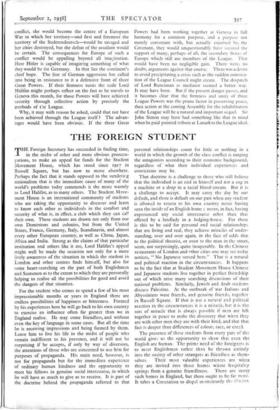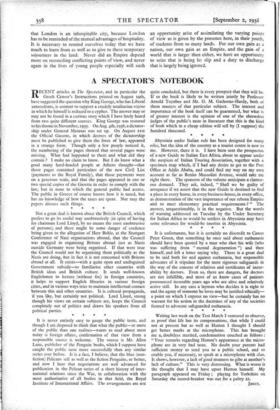THE FOREIGN STUDENT
THE Foreign Secretary has succeeded in finding time, in the midst of other and more obvious preoccu- pations, to make an appeal for funds for the Student Movement House, which has stood since 1917 in Russell Square, but has now to move elsewhere. Perhaps the fact that it stands opposed to the sunderitg nationalism that is the immediate cause of many of the world's problems today commends it the more warmly to Lord Halifax, as to many others. The Student Move- ment House is an international community of students who are taking_ the opportunity to discover and learn to know each other as individuals in the comfort and security of what is, in effect, a club which they can cal! their own. These students are drawn not only from our own Dominions and colonies, but from the United States, France, Germany, Italy, Scandinavia, and almost every other European country, as well as China, Japan, Africa and India. Strong as the claims of that particular institution and others like it are, Lord Halifax's appeal might well be made the occasion not only for a more lively awareness of the situation in which the student in London and other centres finds himself, but also for some heart-searching on the part of both Englishmen and Scotsmen as to the extent to which they are personally helping to realise all the possibilities for good and avoid the dangers of that situation.
- For the student who comes to spend a few of his most impressionable months or years in England there are endless possibilities of happiness or bitterness. Formed by his experiences here he will go back to his own country to exercise an influence often far greater than we in England realise. He may come friendless, and without even the key of language in some cases. But all the time he is receiving impressions and being formed by them. Leave him to live his life in the midst of people who remain indifferent to his presence, and it will not be surprising if he accepts, if only by way of diversion, the attentions of those who are concerned to use him for purposes of propaganda. His main need, however, is not for propaganda but for the immediate experience of ordinary human kindness and the opportunity to meet his fellows in genuine social intercourse, in which he will, have as much to give as to receive. It is ,part of the doctrine behind the propaganda referred to that personal relationships count for little or nothing in a world in which the growth of the class conflict is ranging the antagonists according to their economic background, regardless of what their individual experiences and convictions may be.
That doctrine is a challenge to those who still believe that the individual is an end in himself and not a cog in a machine or a drop in a racial blood-stream. But it is a challenge to accept. It may carry the day by our default, and there is default on our part when any student is allowed to return to his own country never having seen the inside of an English home ; never, in fact, having experienced any social intercourse other than that offered by a landlady in a lodging-house. For there is this to be said for personal and social relationships that are living and real, they achieve miracles of under- standing, over and over again,, in the face of odds that to the political theorist, or even to the man in the street, seem, not surprisingly, quite insuperable. In the Chinese restaurants of London and ether cities one may see today notices, " No Japanese served here." That is a natural and political reaction in the circumstances. It happens to be the fact that at Student Movement House Chinese and Japanese students live together in perfect friendship out of which arise many searching discussions of their national problems. Similarly, Jewish and Arab students discuss Palestine. At the outbreak of war Italians and Abyssinians were friends, and genuine friends, together in Russell Square. If that is not a natural and political reaction in the circumstances it is a miracle, but it is the sort of miracle that is always possible if men are left together in peace to make the discovery that when they are with other men they are with their kind, and that that fact is deeper than differences of colour, race, or creed.
The presence of these students from every part of the world gives us the opportunity to show that even the English are human. The prime need of the foreigners is to meet Englishmen rather than be thrown entirely into the society of other strangers as friendless as them- selves. Their most valuable experiences are when they are invited into those homes where hospitality springs from a genuine friendliness. There are many such homes in England, but there ought to be far mire. It takes a Coronation to dispel momentarily the i!lu3ioa that London is an inhospitable city, because London has to be reminded of the mutual advantages of hospitality. It is necessary to remind ourselves today that we have much to learn from as well as to give to these temporary sojourners in the land. Never did an Empire depend more on reconciling conflicting points of view, and never again in the lives of young people especially will such an opportunity arise of assimilating the varying points of view as is given by the presence here, in their youth, of students from so many lands. For our own gain as a nation, our own gain as an Empire, and the gain of a world that is larger than either, we have an opportunity to seize that is being let slip and a duty to discharge that is largely being ignored.







































 Previous page
Previous page